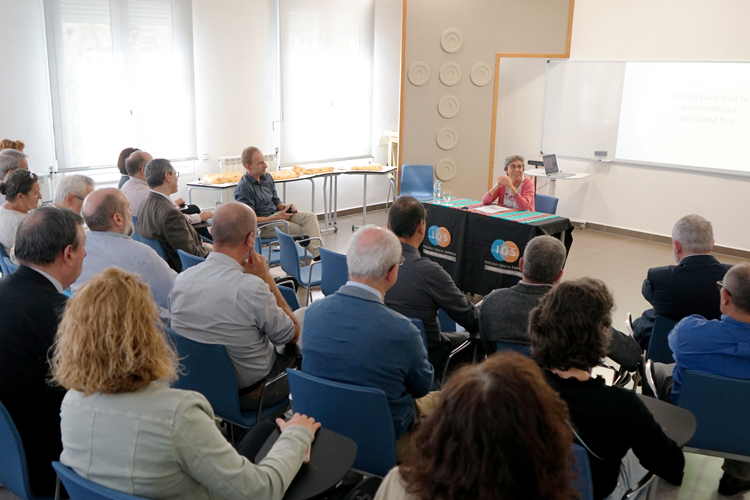This open initiative is aimed at all staff members and features a series of proposals that will be offered to help delve deeper into both the mission of the Society of Jesus and integrating faith and life.

The "Loyola Fridays" event, held on 30 September, kicked off the academic year for IQS Community. IQS Community is a gathering place for IQS staff to internalize the mission of the Society of Jesus and be able to collaborate more closely with the institution of which they form part. This open initiative is aimed at all staff members and features a series of proposals that will be offered to help delve deeper into both the mission of the Society of Jesus and integrating faith and life.
"Loyola Fridays" was the first activity, primarily an occasion for reflection. Professor Xavier Casanovas, a member of the IQS Department of Ethics, guided those present in what Saint Ignatius called a Composition of Place: before praying about an issue, Saint Ignatius suggested that we imagine it as being alive and embodied and that we be able to observe ourselves in the midst of that situation.
After the opening prayer, Casanovas presented the guest Mariola López Villanueva, a Religious of the Sacred Heart of Jesus, who holds undergraduate degrees in Journalism and Biblical Theology as well as a Doctorate in Spiritual Theology from Loyola University of Andalusia. Dr López is the author of several books on theology and spirituality from the perspective of women such as Madeleine Delbrêl, Etty Hillesum, and Dorothy Day.
"How Ignatian spirituality helps us to live today, but a today with interest and purpose" – Mariola López
She presented the pilgrim Ignatius, who was crafting an embodied, living spirituality, a spirituality with open eyes and feet firmly on the ground. She also mentioned the importance of discernment, of daily reflection, to give thanks for what we experience every day, to look at what needs to be repaired, and to ask for grace to return to the path of following Jesus.
She states that discernment is the key to finding our place in the reality of the 21st century and proposed three ways rooted in Ignatian spirituality to make the journey as pilgrims and bear the fruits of the Holy Spirit. The first, a way to help us clean and sharpen our eyes. This involves two movements: at the beginning, we place ourselves under the healing gaze of Jesus, who sees everything good and beautiful within us. At the same time, we must look closely at Jesus to learn to observe as He does, opening our senses to the reality of our neighbours.
The second way involves growing in the ability to give thanks because this will allow us to seek and find God on a daily basis. “Sincere thankfulness leads us to recognize that everything we might have that is good we receive from God and from others. It's gratitude that puts us in our true place as beings: we belong to God and we need each other to move forward,” she explained during her speech.
Dr López's third proposal is based on one of the main tools in Ignatian spirituality, to be there for and help others. This way of navigating our reality connects us with others to help take care of and aid life in unfolding, especially with regards to what is most threatened. To be helped is to be human. We are part of other people's lives and we give ourselves emotional nourishment with the kindness, appreciation, warmth, and trust that we give ourselves in our relationships with others. For Ignatius of Loyola, giving meaning to other lives, loving, and serving are the daily and concrete forms of love.
“Ignatian spirituality leads us to discover ourselves as fragile and called upon, loved in our weaknesses, vulnerable, and resilient, sent to others to collaborate in Jesus' mission. We are asked to love and serve in everything, with our senses wide open to listening to reality, always from a discerning perspective, reaching out to where other people are, and being there for them to move forward, putting the needy and forgotten at the centre, and helping each other to advance towards more connected and full lives," concluded Mariola López. The event ended with a discussion session between the participants and the guest expert, as well some time set aside for book signing.










